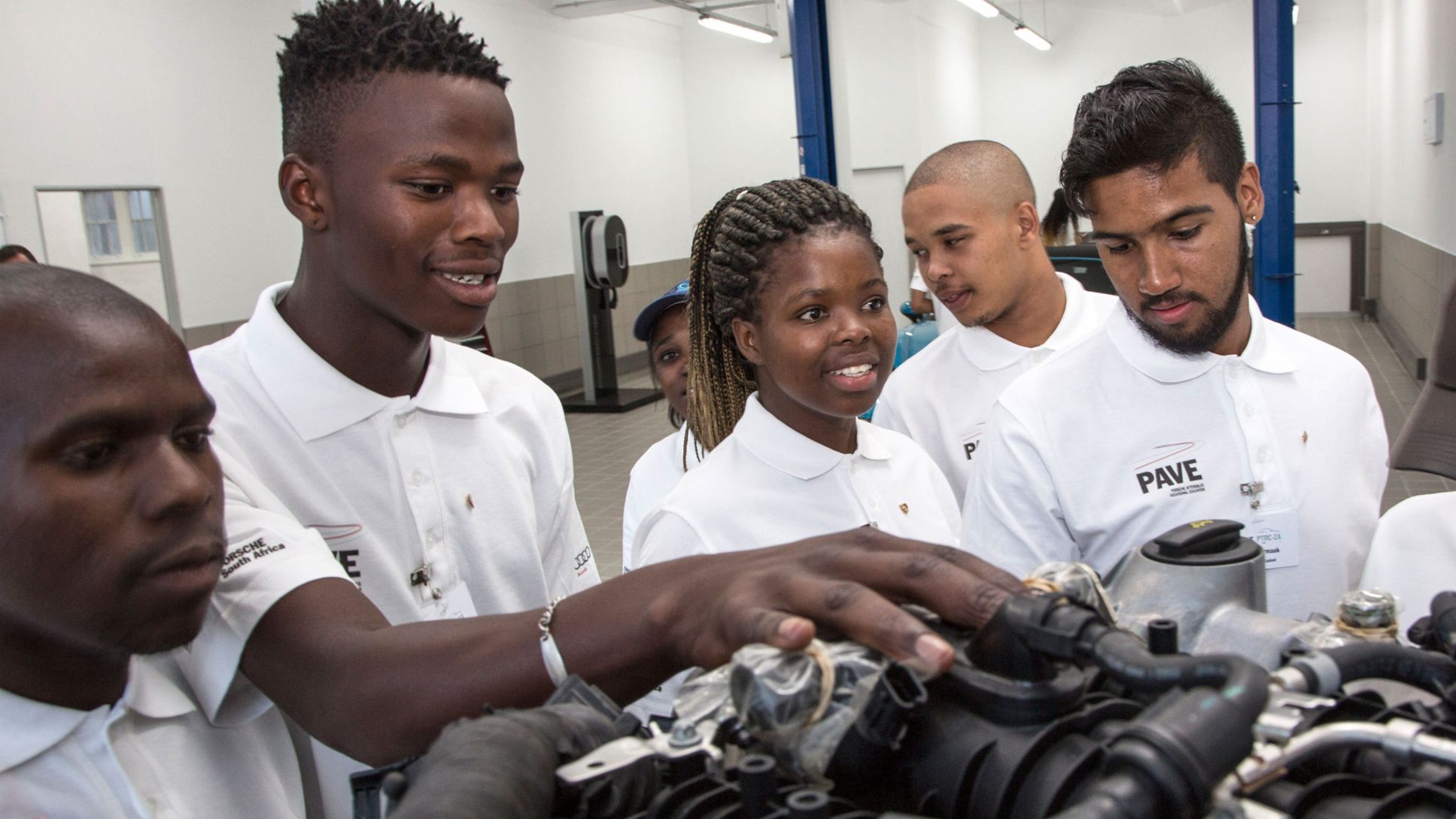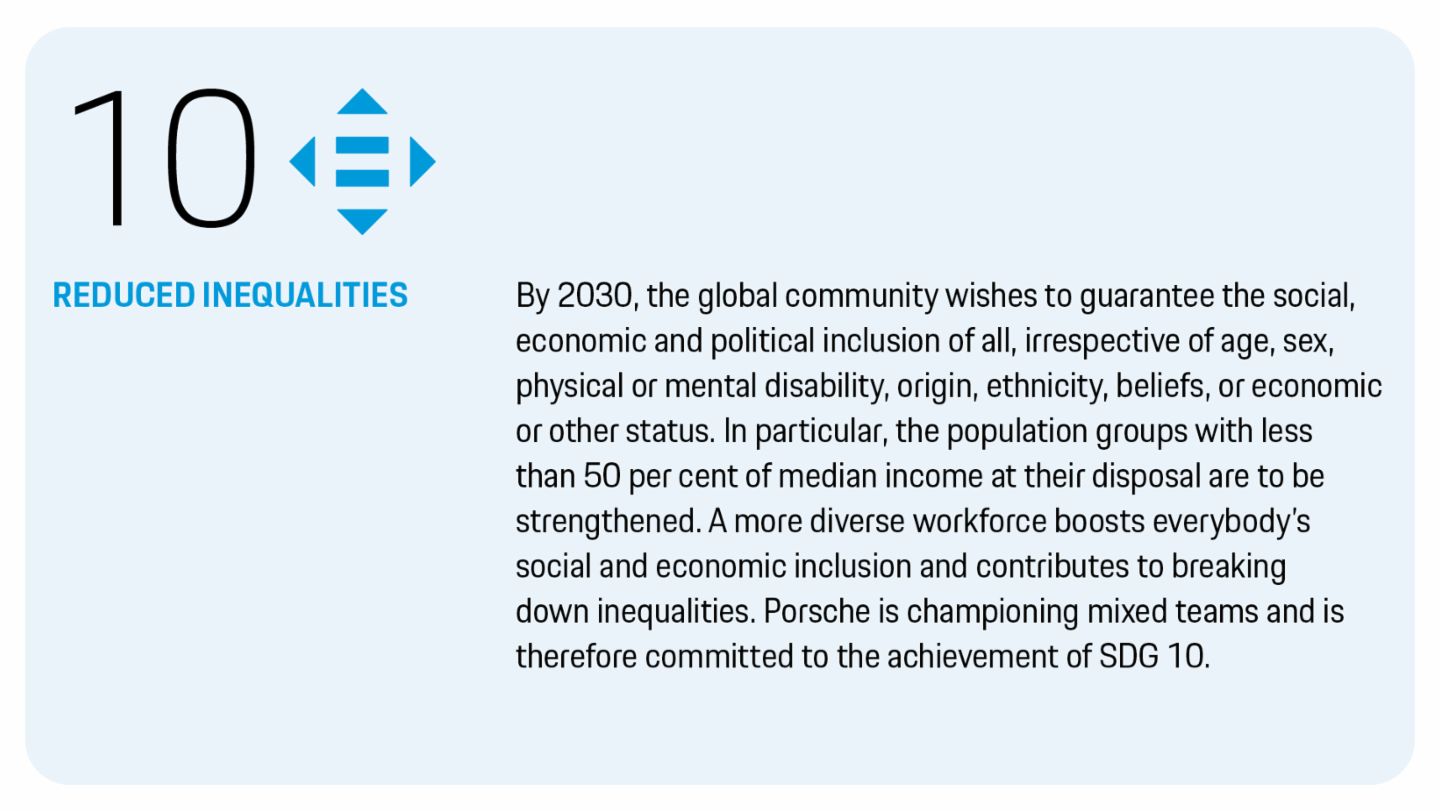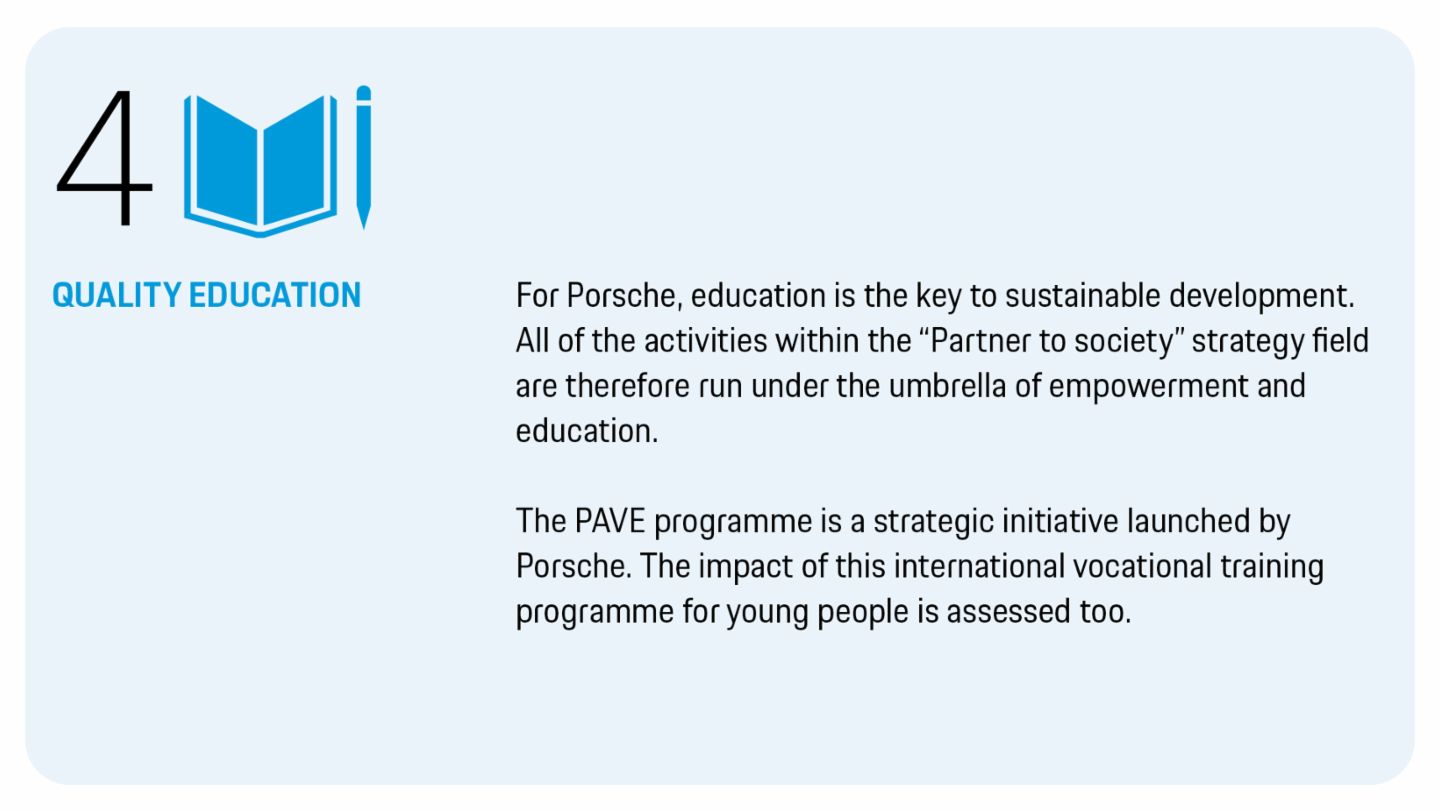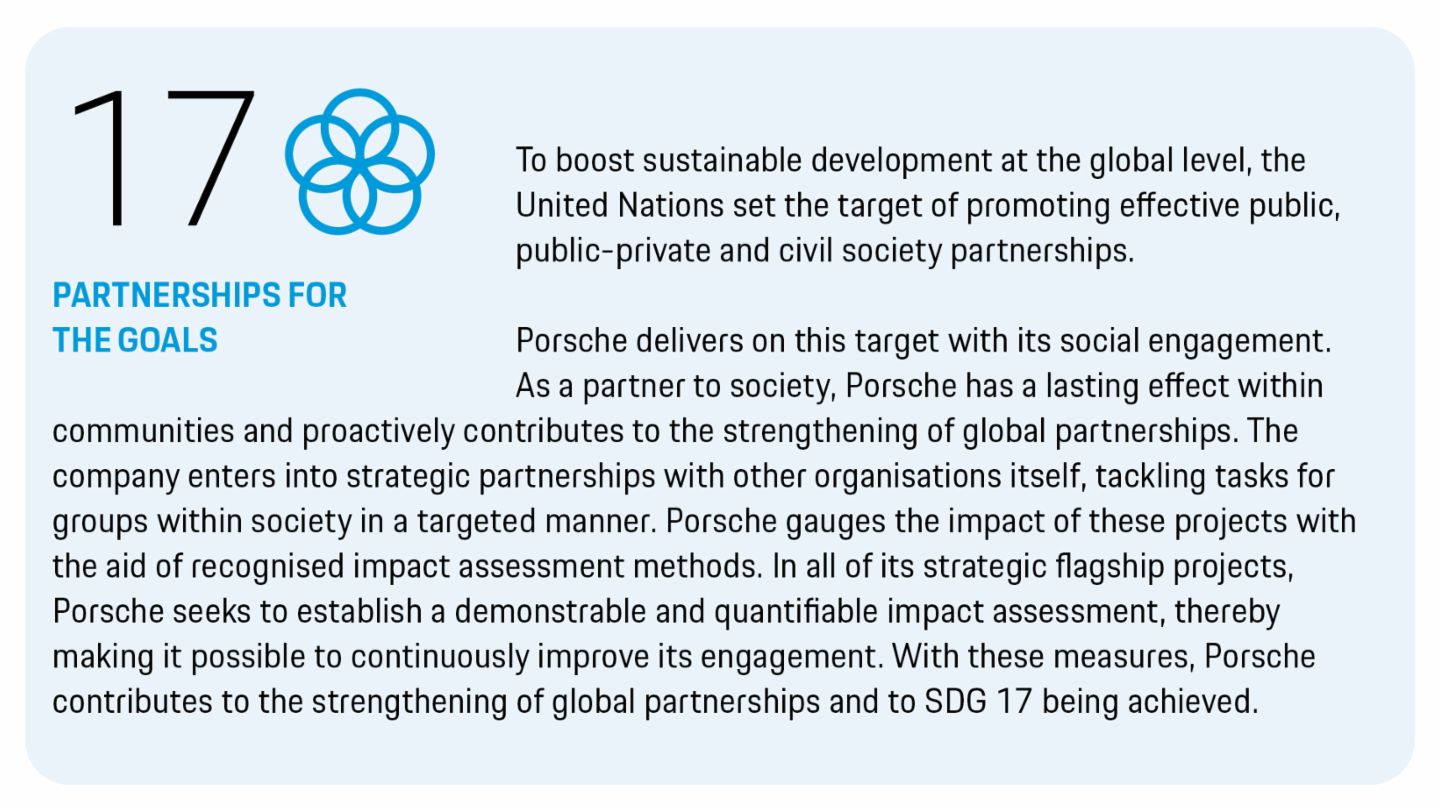Porsche uses projects to campaign for people whose social environment is directly or indirectly related to the company. This applies both to its own sites and to its direct suppliers and business partners. The aim is to conserve the environment, guarantee good labour and living conditions and boost social cohesion.
As part of a global community of values, Porsche assists regions and communities around the world in conserving the environment, guaranteeing good labour and living conditions and boosting social cohesion. The focus here is on young or disadvantaged people. These are to be nurtured and trained in order to sustainably and permanently improve their life situations. The company campaigns for people whose social environment is directly or indirectly related to Porsche. This applies both to its own sites and to its suppliers and business partners. The aim is to promote social innovation and achieve a long-term, quantifiably positive effect with corporate citizenship projects.
In all of its strategic projects, Porsche seeks to establish demonstrable and quantifiable success monitoring. The sports car manufacturer wishes to use targeted measures to improve people’s awareness and skills, enabling them to apply what they have learned in day-to-day practice. Porsche also maintains contact with the participants after completion of the project. In this way, the company determines whether a project is having a lasting positive influence on their lives and how their life situations have changed.
In the year under review, Porsche established long-term impact assessment for all of its strategic flagship projects. With its activities in the “Partner to society” strategy field, the company aims to achieve a high reach and have a major effect. Determining the reach makes it easier to understand the scale of different projects. Specifically, the sports car manufacturer records the added value that Porsche projects generate for society and whether the measures went far enough to promote people in the medium to long term.
Back in 2020, Porsche created a core team comprising representatives of all the relevant organisational units which promotes social engagement projects. This body meets on a monthly basis. The aim is to jointly determine and implement the strategy and to network the departments to this end. The core team set up a company fund in the year under review with which project ideas from throughout the company can be financially supported. In the same year, the fund was used among other things to help further develop the Porsche hilft programme as a volunteering platform.
Porsche hilft
Porsche broadened its support in view of the global consequences of the coronavirus pandemic. It is in this context that the Porsche hilft initiative was established last year. This complements the company’s extensive financial aid with the placement of voluntary helpers.
A digital placement platform lists organisations and associations that need the support of volunteers. Individuals and teams, be they Porsche newcomers or retirees, can then quickly and straightforwardly see where help is needed. The individual projects and organisations are aligned with the Porsche strategy and in particular with the sustainability aspects of engagement and empowerment. The employees frequently make use of this service, with hundreds of hours of voluntary commitment having already been accrued. Trees have been planted, reading evenings have been organised at facilities for the disabled, and disadvantaged youths have been prepared for embarking on a career.
Voluntary engagement is an integral part of Porsche’s cultural self-image. The platform therefore continues to be developed and the array of possible assignments expanded. With Porsche hilft, the company is focusing more than ever before on people – each and every one of us can make an important contribution to society and have a lasting positive influence on it.
Responsible Mica Initiative
Mica is used as a raw material in many industrial and cosmetic products. Porsche processes mica too and is therefore involved in the Responsible Mica Initiative.
The initiative was founded in Paris in 2017. In 2021, the initiative published the Global Mica Standard as a global workplace standard. It promotes safety and fair labour conditions and wages at the processing companies. Companies that join the Responsible Mica Initiative commit to introducing and implementing these standards. The initiative is supported by a range of representatives from the paint, pigment, textile, plastics and cosmetics industries. In the year under review, Porsche was proactively represented on the initiative’s Board of Directors, in the programmes Transparency and Workplace Standards and Community Empowerment, and on the strategy review task force.
Remarkable success was achieved in the area of community empowerment in spite of the coronavirus crisis. More than 3,000 households were provided with hygiene items and food during the pandemic. In total, some 11,000 people were reached through the local projects.
In the area of transparency and workplace standards, Porsche was part of a pilot project which kick-started traceability using blockchain technology. Together with the Responsible Mica Initiative and other representatives, Porsche also gave a presentation to the OECD Forum on the topic of the responsible procurement of mica, thereby raising people’s awareness of this issue.

Sustainability Festival
“Shaping the future together” was the motto of Porsche’s first Sustainability Festival held for all the employees. Over five days, those responsible presented the strategy fields “Decarbonisation”, “Supply chain responsibility”, “Diversity”, “Partner to society” and “Circular economy”. Internal and external experts gave presentations. The live programme, which changed daily, was complemented by many other formats held on an interactive platform. For example, various quizzes and an escape game served as points of entry to the topic of sustainability. Suitable audio accompaniment came in the form of a playlist specially compiled for the festival. The employees were encouraged to become Porsche sustainability ambassadors. The festival communicated concrete ideas regarding how each and every employee could contribute to a liveable future. The project serves as a role model, demonstrating that sustainability remains a strategic priority for the company’s future even during the coronavirus pandemic. It is therefore important that all the employees be informed about and made aware of sustainability issues. We can only shape the future together.
Porsche Aftersales Vocational Education
The Porsche Aftersales Vocational Education (PAVE) programme has been training highly qualified employees in technical professions for more than 10 years. They are trained at international sites in accordance with European standards. The employees are then appointed to the dealer organisations of Porsche and other Volkswagen Group brands around the world. Both the trainees and the Group benefit from PAVE. For example, it affords predominantly disadvantaged young adults access to sound, first-class vocational training. The dealer organisations are provided with highly qualified employees. And thanks to long-term, strategic school partnerships, vocational training skills are embedded locally. PAVE therefore has a lasting, effective impact. At the same time, changes in vocational training needs are responded to flexibly and in advance. Promising future prospects and development opportunities are created for the programme graduates. These lead not only to greater self-determination for the individuals, but also to social improvements.
CASCADE
Porsche and Michelin are campaigning for the sustainable extraction of natural rubber. With the project CASCADE (Committed Actions for Smallholders Capacity Development), the sports car manufacturer and the tyre manufacturer are championing greater transparency and better labour conditions during extraction of this raw material. With the initiative, the partners are supporting numerous smallholders involved in rubber extraction in Sumatra, Indonesia. Training and education in production practices, biodiversity and occupational health and safety aim to lastingly improve the smallholders’ circumstances and economic situations. Indonesia is one of the world’s primary rubber producers. Porsche and Michelin identified potential supply chain sustainability risks related to rubber extraction on the basis of analyses, conducted among other things with a specially developed app, and talks held locally. The initiative is training more than 1,000 smallholders to make their production methods more environmentally friendly and more efficient. Porsche and Michelin are jointly investing some one million euros in the project which is initially set to run until 2024.
Corporate Co-Determination
Occupational safety is a top priority for Porsche and its employees. An organised and structured occupational health and safety management system ensures a uniform approach and is designed to ensure that legal provisions are implemented.
One of the key pillars of Porsche’s corporate culture is corporate co-determination. There is regular dialogue between the employer and the employees, including on difficult issues. Open and direct communication across all hierarchical levels is a long-standing tradition at Porsche. It provides the basis for exceptionally constructive cooperation. Alongside collective bargaining agreements, corporate co-determination is a key tool with regard to good work and employees who apply themselves. The advantages of corporate co-determination include better labour conditions, higher and fairer wages, more training and professional development opportunities, greater job security and a good work-life balance.
Works Councils and collective agreements
Porsche’s main site is in Germany. This means it is required by law to engage in collective co-determination. The company has been systematically meeting this obligation for decades and has positive experience in this area. For Porsche, it is natural for employees and their legal representatives to be informed as soon as possible and in as much detail as possible about any significant changes regarding operational workflows or the organisation of the company. This is done in compliance with national laws, applicable collective bargaining agreements and works agreements, including beyond Germany’s borders. The information channels used here include the Supervisory Board with equal representation, the Works Council committees, a range of communication formats and the works agreement database on the intranet.
Porsche has in place collective agreements on wages and conditions that apply to all full-time and part-time employees. Remuneration is made transparent on the basis of the applicable pay framework agreement. An additional Labour Market of the Future package has been agreed, which brings together numerous working time regulations. These include flexible working hours, voluntary personal sabbaticals and care leave. The company is also a member of the employers’ association Südwestmetall and is therefore part of the social partnership actively practised between the metal and electrical industry and the IG Metall trade union.
Open communication channels
Porsche offers its employees numerous ways of making suggestions, reporting problems or registering complaints with committees and decision-making bodies. One example includes the union ombudsman structure. It is also possible to talk directly to individual members of the Works Council at any time. Alongside the Works Council, there are interest groups for employees with severe disabilities and representation for young workers and trainees. Both of these bodies are closely integrated with the Works Council and involved in its decision-making processes.
Co-determination in the workplace continues to play an important role in the new digital era. The primary aim here is to cover all mandatory areas requiring co-determination by law to ensure compliance. Examples include the introduction of IT systems that are capable of monitoring employee conduct or performance and data protection measures or rules on the use of electronic media for communication. Porsche endeavours to involve the employee representatives early on in the development process. Close collaboration between the company and employee representatives is also highly important when it comes to research into operating solutions for the new digital world of work. Internal media are used to inform employees about current topics, especially from the perspective of the employees and their elected representatives.
In addition, the Works Council keeps employees fully updated about its works meetings at each of Porsche’s sites in Germany and thus provides an open platform for discussion. The coronavirus restrictions during the reporting year meant that no works meetings could take place. Communication with the workforce was therefore maintained via the intranet, information videos and mailings.
Occupational Health and Safety

The protection of employee health and safety is a core responsibility for any company. It is also a basic prerequisite for ensuring a motivated and capable workforce. Porsche’s occupational health and safety management has a key part to play here, ensuring that the company can continue to develop, produce and sell exclusive, in-demand vehicles.
Regulated occupational safety processes
Occupational safety is a top priority for Porsche and its employees. An organised and structured occupational health and safety management system ensures a uniform approach and is designed to ensure that legal provisions are implemented. This helps to prevent workplace accidents and occupational diseases as far as possible.
The central processes are standardised and are set out in the Group guideline on occupational safety. Occupational safety is regulated in law in Germany, so the Group guideline represents a major element of Porsche’s compliance management system. It applies to the whole workforce. The managers are to ensure that their employees are familiar and comply with the provisions of this guideline. Specialists in occupational safety and works doctors are available to all employees in an advisory capacity. All staff members are also represented through their legally defined representatives in the occupational safety committees in accordance with Germany’s Occupational Safety Act (ASiG). The Group guideline is currently being updated. It is to be extended to include health protection and will then serve as the basis for a certifiable occupational health and safety management system.
Safe and humane labour conditions are particularly important in view of a world of work which continues to gather pace and is becoming more demanding as a result of automation and digital transformation. The Occupational Safety department is open to receiving queries from employees. In addition, it regularly tours workplaces with managers who have local responsibilities and provides assistance with risk assessments and standard operating procedures.
Workplaces, machinery and equipment are designed with input from safety engineers with the aim of preventing accidents and risks to health. Construction and installation sites are overseen and monitored by special construction experts beyond what is required by law. Safety standards are subject to ongoing refinement as part of this process.
In the event of workplace accidents, the causes are analysed in detail and appropriate measures are implemented in the form of action plans to avoid future accidents. The occurrence of workplace accidents at Porsche and in its organisational units is measured using the injury rate (occupational accident index) and reported monthly. Porsche endeavours to continuously improve workplace safety for the employees on the basis of annual targets.
Preventive health management
Health management encompasses all of the topics that contribute to the health of employees. In addition to safety systems and the provision of local medical care for employees working at the sites, there are services for preventive health promotion in the workplace. Porsche Health Management offers courses on healthy eating, relaxation techniques and effective self-management. Employees can also access individual physiotherapy advice at the workplace. On the basis of the Occupational Safety Act, the works doctors assist with the design of healthy and ergonomic workplaces. They advise the employees and carry out preventive checks. In addition, they assist with the organisation of first aid and help with the reintroduction of employees to the workplace after illness.
The Health Management division is responsible for all health promotion activities, structures and processes. A number of company health departments are responsible for providing medical care at work. As a preventive discipline, occupational health care plays a key role in occupational health management. The works doctors’ responsibilities include analysis of the effects of work on employees. They also promote the employees’ health and productivity and assist the employer in planning healthy labour conditions. Occupational health care also encompasses emergency paramedics as part of first-aid organisation, meaning acute and emergency health care is always guaranteed at the plants.
Porsche has a targeted occupational reintegration management system in place for restoring employees’ capabilities after longer periods of illness. For example, the affected employees are reintroduced to the strains of working by means of gradual workplace reintegration. Porsche’s Health Management division also provides social counselling to those with psychosocial stress and support for those in difficult life conditions.
Employee integration
All the employees are represented in occupational safety committees by statutory representatives. The site-specific occupational safety committees meet four times each year. All the employees receive information on occupational safety at least once a year. This ensures that they are kept up to date on specific hazards and rules of conduct. The intranet also contains a broad range of information and education on health and safety in the workplace.
To avoid risks to other companies’ employees at Porsche sites as much as possible, Porsche stipulates detailed rules of conduct. These apply in particular to construction sites, but also to the procurement and assembly of machinery and equipment.
Support during the coronavirus pandemic
Porsche’s emergency response organisation dealt in detail with the coronavirus crisis during the reporting year. It implemented appropriate measures to protect employee health. In addition to providing information to affected internal departments, this also included communication with public authorities. A telephone help desk and a centralised inbox are used by employees as a point of contact for all queries relating to the coronavirus. Employees engaged in administration activities were able to work remotely for their own protection. In the course of a 10-week campaign of vaccinating against COVID-19, more than 14,000 vaccine doses were administered by Porsche’s Health Management division at vaccination centres set up especially. This service was made available to employees and their families.





